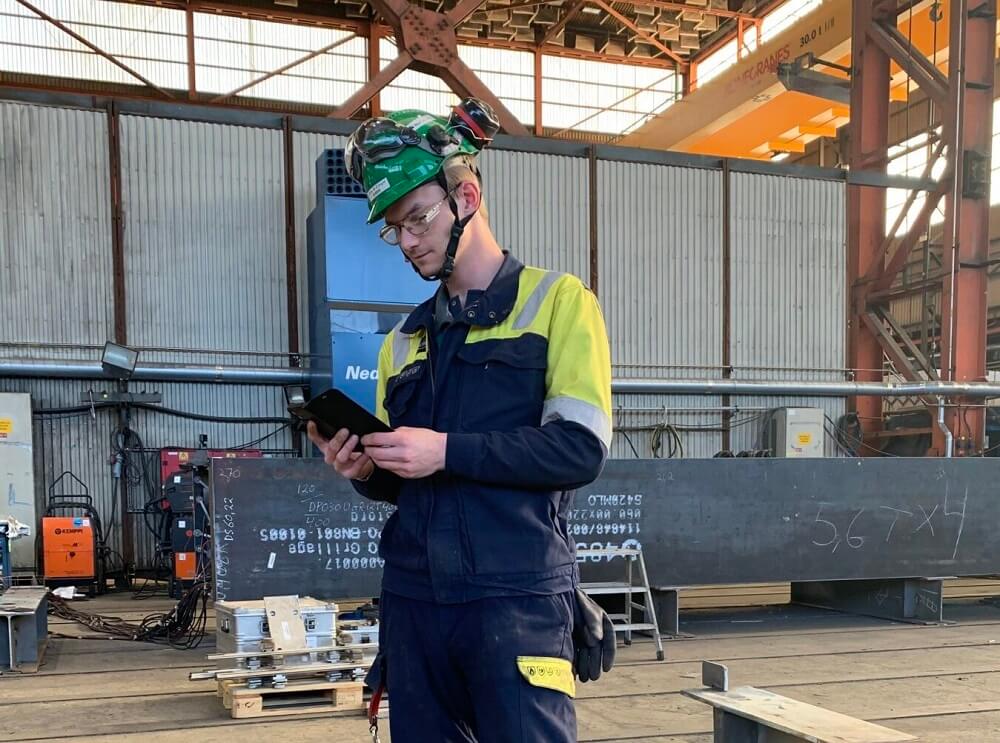Simple Digital Tool Improves Safety at Norwegian Offshore Shipyard

[By Håvard Egge]
Aker Solutions (AKSO) used to have physical suggestion boxes dotted around its yards. These were an important component of its continuous improvement work, but people gradually stopped using them, and they ended up gathering dust instead. Basically, it turned out that this kind of system just doesn’t work anymore.
That’s why Aker Solutions has been working with a multidisciplinary team of researchers from SINTEF to develop a customised digital solution. It has led to much better communication and opened numerous new project follow-up opportunities.
“The result is a popular system which is already being frequently used by staff, and it seems to be bringing out the potential of improvement work,” explains Trond Haga, who is project manager at Aker Solutions.
App lowers the threshold
The new solution comes in the form of a mobile app and computer software. The app makes it easy for any employee in a yard to suggest improvements.
“Issues brought up in the suggestion box tend to be about quality, practical improvement processes and measures that could help to improve HSE in someone’s workplace,” explains SINTEF researcher Ottar Bakås.
When an employee thinks of a way in which something could be improved, all they have to do is get out their mobile, take a photo or make a video, and enter some keywords. The fact that it is so easy lowers the threshold for making suggestions.
“It used to be more rigid. If you had a good idea, you had to write it down and put it in a postbox, which was probably in a different part of the yard,” says Bakås. As a result, Aker probably missed out on countless good suggestions.

Courtesy Aker Solutions Stord
Using the suggestion box is easy
“The app is really easy to use. It’s user-friendly, especially for someone working out in the yard, because all they have to do is take a photo and then later, when they have time, draw on it and write a brief summary explaining their suggestion. This makes it easy to communicate and get processes started. That’s probably the best thing about the solution,” says Haga.
He explains that problems which may have been annoying employees for a long time have now moved onto the agenda and been dealt with. An example of a specific suggestion is the idea of using leather covers for welding cushions so that they don’t wear out so quickly.
“The plastic covers that we used to use had to be replaced very frequently,” explains safety representative Kristoffer Andersland, adding:
“Other examples of suggestions that people submitted have been to change the airflow direction on new welding helmets to deflect uncomfortable airflows away from welders, and to paint fire extinguisher signs to make them even more visible.
Supporting the Aker model
“The suggestion box enables decisions to be made at the lowest possible level and gets the people who are closest to the work situation involved in making those decisions,” Bakås explains.
As well as the feature for submitting suggestions, the system has an additional function for bigger improvement projects that require greater investment. The digital system supports AKSO’s excellent long tradition of cooperation between employee representatives and employees, often known as the Aker model.
“In this model, various working committees, representing a broad spectrum of employees, are involved in deciding which improvement initiatives should be prioritised. This means that the suggestion box supports the company democracy and gives the working committees a good tool with which to gather all the relevant information.
This gives it an added value that cannot be matched by a Facebook group or e-mail address.
Inviting participation
In the digital suggestion box, all the information is visible to everyone. The history is stored and acts as a knowledge database that can be used for training and sharing across projects, disciplines and yards.
“In the past, many people felt that if they submitted a suggestion, they would never hear anything more about what had been done with it. In the worst case, that lack of feedback could mean that people lost interest in getting involved in improvement work. Here, the suggestions can be seen by everyone, and you can comment on what other people have written. You can also see the status of all the suggestions. And you can even vote in support of good ideas,” explains SINTEF researcher Tore Christian B. Storholmen.
Social media functions
In order to encourage participation, the researchers made the conscious decision to give the app social media functions. For this, AKSO and SINTEF needed to team up with software developer FunkWorks.
“Before, we had an Excel sheet here and a database there. It was difficult to keep track and update the processes. And it wasn’t very transparent. That’s why we wanted to have everything in one system, including functions like social media. This makes it easy to retrieve suggestions for processing, stimulates improvement and keeps the innovation motor running,” AKSO’s Haga explains.
User participation in development
The development process has benefited from a high degree of user participation and involvement. That is essential if you want to develop digital solutions that work well for the people who use them.
“We’ve worked closely with the end users. They were able to make suggestions throughout the process and helped to test solutions and interfaces. As a result, many of them were familiar with the new system when it was rolled out,” Storholmen explains.
The suggestion box is already being used diligently by many of AKSO’s employees.

that matters most
Get the latest maritime news delivered to your inbox daily.
“I think that many major public institutions and other big enterprises could benefit tremendously from a customised digital suggestion box. However, it’s worth noting that getting a tool like this established takes time, but it’s worth it in the end,” says Bakås.
This article appears courtesy of Gemini News and may be found in its original form here.
The opinions expressed herein are the author's and not necessarily those of The Maritime Executive.
